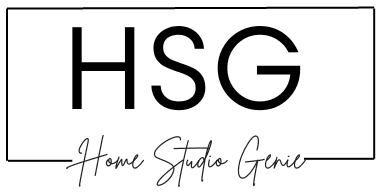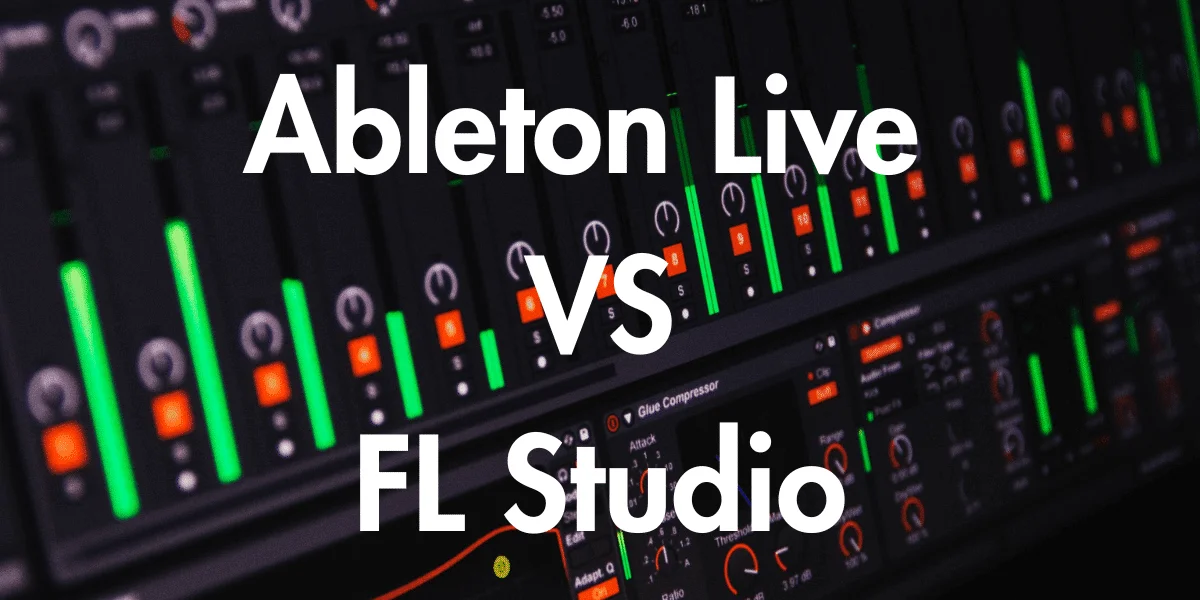We recently noticed that both beginners and pros often jump around between different DAWs. This is mostly because one DAW can offer different features compared to the next.
Another important point is that producers and musicians often have different workflows and creative patterns. This is where Ableton Live and FL Studio come to mind
Ableton Live vs FL Studio has been a controversial topic in the music production scene. In this guide, we’re putting them against each other to let you choose the best for you!
Let’s jump straight into it.
Quick Glance:
Ableton Live:
| Aspect | Pros | Cons |
| User Interface | – Colorful and visually dynamic interface | – Visual complexity may overwhelm some users |
| Audio Editing | – Powerful audio editing capabilities | – May lack real-time audio manipulation features |
| MIDI Features | – Excellent MIDI features, intuitive piano roll | – More focused on electronic music styles |
| Instruments & Plugins | – Vast library of virtual instruments and plugins | – The learning curve for managing third-party plugins |
| Composition | – Pattern-based workflow for easy composition | – Less suitable for live performances |
| Performance | – Generally stable performance | – Fewer pricing options compared to Ableton Live |
| Updates & Community | – Lifetime free updates after purchase | – Some advanced features may require additional resources |
| User Community | – Strong user community with extensive tutorials |
FL Studio:
| Aspect | Pros | Cons |
| User Interface | – User-friendly, minimalist design | – Minimalism may feel limiting for some users |
| Audio Manipulation | – Real-time audio manipulation | – Audio editing may be less intuitive |
| MIDI Capabilities | – Good MIDI capabilities | – Fewer built-in instruments compared to FL Studio |
| Sound Design | – Versatile instrument racks and effects | – May not be the best for traditional composition |
| Workflow | – Encourages experimentation and improvisation | – Can be resource-intensive, impacting system performance |
| Performance | – Known for stable performance | – Different versions can be expensive |
| Version Options | – Offers multiple versions with varied pricing | – Support quality may vary based on the version |
| Community | – Vast user base and active community |
Overall Features For Live vs FL Studio
Ableton
The intuitive and streamlined interface of Ableton Live makes music production accessible even if you’re a beginner or a seasoned pro. Focus on creativity without complicated menus getting in the way.

Its audio and MIDI editors let you refine sounds and sequences with precision and control. Personally, I love how easy it is to remix on the fly during live shows – the energy from the crowd truly inspires improvisation.
FL Studio
Having used both for years, I’ve come to appreciate FL Studio’s more customizable workflow. The traditional mixer gives me the flexible control I need to shape each element and craft balanced, polished mixes.

Experimenting with the timeline also helps bring structure to my song arrangements. Another bonus is the extensive effects library – browsing categories make it simple to add new textures.
To top it off, FL Studio offers multiple paths to the same destination, so you can develop an intuitive process tailored entirely to your needs.
User Interface And Workflow
Ableton Live
Having used both Ableton and FL Studio extensively in live performances and studio work, I’ve found Ableton truly shines in its dual views that cater to various stages of making music.

The session view inspires spontaneous creativity with its impromptu looping, while the arrangement view allows meticulous track building.
Part of what I love is how quickly and smoothly I can switch between the two.
Another favorite is Ableton’s track freezing to save CPU – a real timesaver. Its organizable browser keeps my samples and sounds neatly tucked away.
FL Studio
That said, FL Studio offers a highly customizable interface that some find preferable. Retooling the windows to my exact specifications definitely supported my unique workflow.

Being able to save these personalized layouts was also handy. Where FL Studio excels most is its nuanced MIDI editing tools.
The step sequencer and piano roll provide pinpoint control—ideal for programmed beats and melodies.
Both DAWs have pros, so it depends on an individual artist’s needs and preferences. Overall, they cover all bases of creation, so you can’t go wrong with either in your productions.
Plugins And Instruments
While both DAWs offer versatile instruments and effects to spark creativity, in my experience FL Studio has boasted a wider selection—especially with its thriving third-party community developing new tools.
Sytrus, Harmor, and the rest of FL’s natives are studio staples of mine. That said, Ableton packs uniquely powerful creations like Sampler and Simpler into its lineup.
Precisely shaping loops and clips in those has guided many an inspiration. Of course, both ecosystems integrate additional VSTs/AUs as well.
Many producers find that either platform facilitates expressive sound design. But FL Studio’s expansive library, from FruityReverb onwards, offers a veritable buffet of choices.
Still, Ableton’s curated packages serve up solid starting points. For those just setting out, the built-ins may be all you need.
More seasoned artists likely want to explore the depths of whichever platform inspires their distinct voice.
Music Production Style
Based on our experience using both DAWs, Ableton truly shines for live performance and electronic music.
Session View lets us freely experiment with sound combinations—inspiring fresh ideas on stage.
I also love saving groups of effects as Racks presets, giving my live sets dynamic textures. Of course, Max for Live takes patching to a new level with customizable plugins.
FL Studio 20 presents a powerful all-rounder. The step sequencer and piano roll excel for beat-making and pop arrangements by facilitating complex rhythms with ease.
Meanwhile, Sytrus and company comprise an arsenal of sound design that continues to fuel new directions in my productions. Integrating outside VSTs only multiplies FL’s sonic potential.
Both platforms empower diverse genres through adaptable workflows and extensive tools.
For spontaneity in live sets though, Ableton has an edge with its performance-centric features. In the studio, FL Studio caters to meticulous craft across many styles.
Both hold space in my home studio as trusted producers who keep my muse flowing.
Compatibility
Ableton Live
| Operating System | Compatible? |
| Windows 7 | No |
| Windows 8 | No |
| Windows 10 (64-bit) | Yes |
| macOS High Sierra 10.13 | Yes |
| macOS Mojave 10.14 | Yes |
| macOS Catalina 10.15 | Yes |
| macOS Big Sur 11 | Yes |
| macOS Monterey 12 | Yes |
FL Studio
| Operating System | Compatible? |
| Windows 7 (64-bit) | Yes |
| Windows 8 (64-bit) | Yes |
| Windows 10 (64-bit) | Yes |
| macOS High Sierra 10.13 (64-bit) | Yes |
| macOS Mojave 10.14 (64-bit) | Yes |
| macOS Catalina 10.15 (64-bit) | Yes |
| macOS Big Sur 11 (64-bit) | Yes |
| macOS Monterey 12 (64-bit) | Yes |
Price
Of course, the financial forecast matters greatly too. FL Studio stakes out a range of passes from pinch-penny up.
Want just the hit-making essentials?
Their entryway covers core sounds and sequencers.
Or splash serious cash on a deluxe edition overflowing with tools of the trade.
Ableton keeps it simple with two taking two tiers – Standard and Suite. Entry registers around basic beat-building at a midrange charge.
But ah, that Suite stash – so supple with plugins, plus Max for Live makes magic with modularity. Pricey perhaps, but for pros the possibilities could price it right.
Ableton Live
| Version | Price (USD) |
| Ableton Live Intro | $99.00 |
| Ableton Live Standard | $449.00 |
| Ableton Live Suite | $749.00 |
| Ableton Live 11 Upgrade from Intro to Standard | $350.00 |
| Ableton Live 11 Upgrade from Intro to Suite | $650.00 |
| Educational discounts | Available for eligible students and teachers |
FL Studio
| Version | Price (USD) |
| FL Studio Fruity Edition | $99.00 |
| FL Studio Producer Edition | $199.00 |
| FL Studio Signature Bundle | $299.00 |
| FL Studio + ALL Plugins Bundle | $899.00 |
| FL Studio Mobile (iOS/Android) | $15.99 |
FAQs
Is Ableton Or Fl Better For Beginners?
Both are pretty beginner-friendly in their own ways. FL Studio’s step sequencer and piano roll make building beats a breeze.
Does Fl Studio Sound Better Than Ableton?
Now this is subjective! They simply provide production tools at their cores – it’s up to YOU to finesse some fire beats.
A skilled engineer can craft hits in either one.
Don’t stress quality too much; focus first on the fun of learning. Sound is sculpted more by your ears and skills over time.
Is Fl Studio Easier Than Ableton?
It depends! FL Studio tends to present one path creatively, while Ableton offers different views to explore.
FL may feel simpler if you sequence beats primarily. But Ableton streamlines live performance. Overall they aim to empower, not overcomplicate.
Wherever you feel most at home is what “easiest” means for you personally.
Final Thoughts – Ableton Live vs FL Studio
Ableton Live’s lightning-quick workflow and session view tailor it for live showmanship like no other.
Its intuitive interfaces now wow beginners too with streamlined access to bountiful instruments.
Though its learning curve exceeded FL’s out the gate, Live 11’s catapulted it neck and neck with stalwarts as a full-service producer’s pad.
FL Studio remains king if sequencers are your soundtrack though. From its pattern-based navigation to included plugins in droves, it unleashes sound experimentation.
Plus lifetime updates ensure it evolves with electronic music itself. Whether just starting out or envisioning sonic masterworks, FL sets the foundations.
Both now field pro-level power but shine through varied specialties. Trial each and let informal jam sessions seal the deal.
Sources:
https://www.ableton.com/en/products/live-lite/
https://en.wikipedia.org/wiki/Ableton_Live
https://blog.landr.com/ableton-live-ultimate-overview/
https://mastering.com/fl-studio-tutorial/

Mike is a skilled musician, guitar technician, and music producer with a passion for audio and gear. He excels in teaching guitar, editing podcasts/videos, and creating captivating soundscapes using cutting-edge hardware, software, and plugins. Mike’s talent and commitment make him highly sought-after in the industry, inspiring fellow musicians worldwide.


